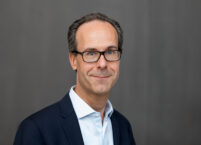Meet your professors | Prof. Dr. Frank Piller
An interview with Prof. Dr. Frank Piller, Head of Chair at the Institute for Technology and Innovation Management (TIM) and teaching professor in our M.Sc. Management & Engineering in Technology, Innovation, Entrepreneurship & Marketing.

Prof. Dr. Frank Piller
Could you briefly introduce yourself?
Prof. Piller: I spent many years researching at the Technical University of Munich and the MIT Sloan School of Management. During my time at the MIT, I co-founded the MIT Smart Customization Group, a really exciting experience! I was offered a position as professor of technology & innovation management at RWTH Aachen University in 2007 and was quick to accept that offer as I could see many parallels between Aachen and MIT.
Are there any big innovations in management education?
Prof. Piller: That’s a very good question! The way we teach and learn at universities has remained remarkably stable across centuries: A teacher and a group of students that need to be physically present at the same time and at the same location. But the digital transformation is also making inroads into university or tertiary education. A lot of knowledge can be digitized, meaning I can go to a film studio, have my lectures filmed, and post these videos on YouTube. All of a sudden, I can reach millions of students and none of these students have to be physically present in Aachen – and still we can have a really interactive learning experience.
Does that mean that the MME TIME will become entirely digital in a few years?
Definitely not! You see, teaching videos are great for transmitting relatively standardized forms of knowledge. But complex management challenges cannot be solved by applying standardized formulae. Instead, you need to develop a set of methodological skills that you can apply across different situations. To effectively learn these skills, you need to interact with your teachers and especially with your classmates, discuss practical case studies, and work in teams on complex projects.
Hence, we try to combine the best of both worlds in the MME TIME program. Many courses use teaching videos, but these videos are just the starting point for critical discussions and projects. There is just no substitute for direct interaction, and it doesn’t really matter whether that interaction takes place online or offline as long as it allows students to learn to the full extent.

